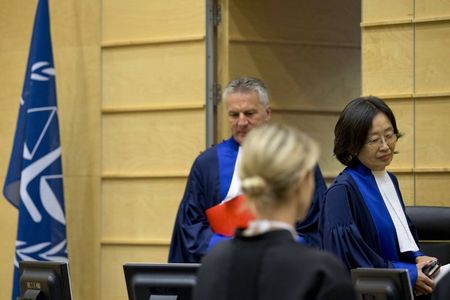By Thomas Escritt
THE HAGUE (Reuters) - Kenya's president became the first sitting leader to appear at the International Criminal Court on Wednesday as supporters gathered outside, calling for his crimes against humanity trial to be scrapped.
President Uhuru Kenyatta was summoned to the Hague-based tribunal to answer questions about his indictment on charges of orchestrating a wave of deadly violence that swept Kenya after contested elections in 2007. He denies the charges.
Prosecutors have accused Kenyan authorities of refusing to hand over bank and phone records, obstructing the case which has faced a series of delays since it was launched five years ago.
Prosecutor Benjamin Gumpert said there was no evidence that Kenyatta himself had intentionally interfered in the investigation, but said Kenya was failing to abide by its obligations and that sanctions should be considered.
"It would be wholly inappropriate for the case to be withdrawn where there has been obstruction of the proper inquiries," Gumpert told the tribunal. "The interests of justice should be paramount here."
Judges on Wednesday were considering a request from prosecutors to adjourn the trial and refer Kenya's alleged non-cooperation to the court's member states, who could then decide on sanctions.
Dozens of Kenyatta's supporters waited outside the court and broke into song as his convoy arrived.
Kenyatta was the first sitting head of state to answer a summons to the court, established 11 years ago to prosecute individuals for serious crimes when domestic courts are unwilling or unable to do so.
Kenyatta and allies have warned that the trial risks destabilising a region that faces a threat from resurgent militant Islam in Somalia.
"This is no time to weaken a country and a region by removing its President for trial," said Mahboub Maalim, head of the Intergovernmental Authority on Development regional organisation, who was in The Hague for the hearing.

The case is seen as a major test of the ICC which has secured only two convictions in the 11 years since it was set up.
(Reporting By Thomas Escritt; Editing by Anthony Deutsch and Andrew Heavens)
